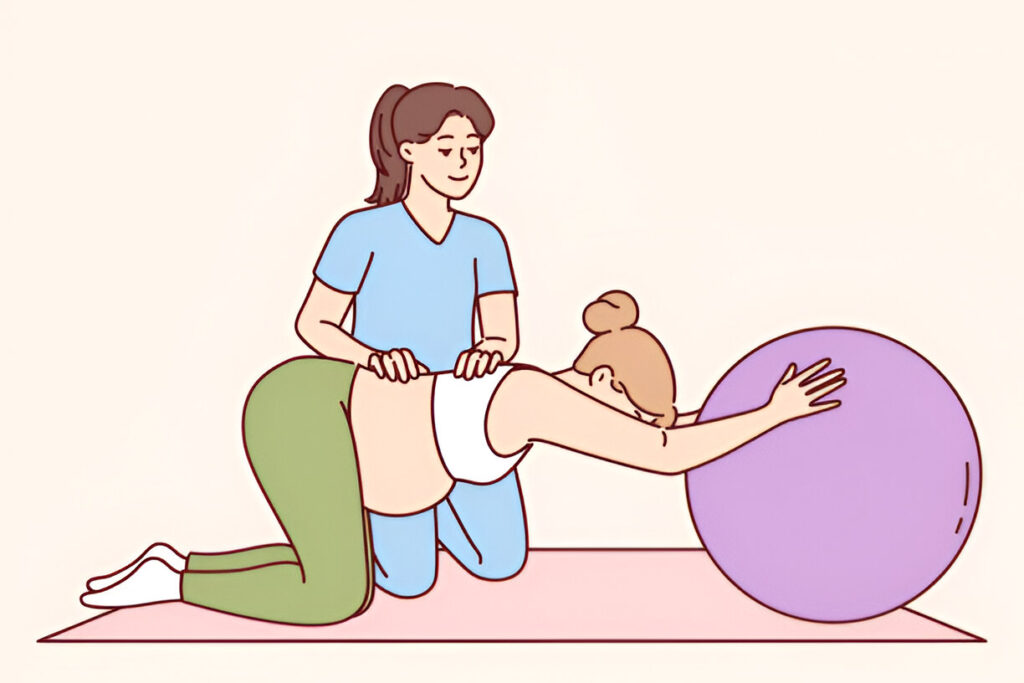Useful Habits for a Stress-Free Pregnancy
1. Prioritize Rest and Sleep
Maternal health relies on adopting key habits that promote well-being during pregnancy while fostering emotional stability. The first of these habits is establishing healthy habits. Maintaining a consistent sleep regimen might help improve sleep patterns.

The Importance of Sleep
Sleep is an essential part of maternal health, which people commonly fail to address. Pregnancy leads to happiness together with medical difficulties, hormonal changes, and emotional adjustments in women.
Various pregnancy-related factors create sleep disturbances that leave pregnant women tired and anxious. Establishing regular sleep times is the most important strategy to minimize pregnancy fatigue while benefiting maternal wellness throughout the term. Getting enough rest and sleep will benefit your health and the development of your fetus.
The Impact of Sleep on Maternal Health
Sleep is an essential component in retaining pregnancy health. Pregnant women experience sleep disturbances as their bodies adjust their metabolism and produce hormones while taking on physical stress associated with fetal development.
When sleep duration is inadequate, the body struggles to heal itself, recharge, and rejuvenate. High-stress levels, together with anxiety and mood swings, will harm the health of mothers during this period.
How Sleep Affects Emotional Well-Being
Pregnancy generates wild emotional responses that impose similar stress on mental health as the physical body feels. Common pregnancy hormones trigger mood swings as well as anxiety and occasionally depression in women.
Your body achieves emotional stability by getting restorative sleep through regular sleep timing. Your body enhances mood-stabilizing chemical production as part of restful sleep, resulting in better emotional well-being.
Insufficient rest makes emotional control difficult for the body to achieve. Sleepless nights create both agitation and mental frustration and intensify anxiety levels among people. The elevated stress levels make pregnancy physical and emotional adjustments harder to handle.
Consistently going to bed and waking up at the same time daily through a sleep routine allows pregnant individuals to manage emotional fluctuations that enable smoother navigation of pregnancy issues.
The Link Between Sleep and Physical Health
The physical health of expectant mothers and fetuses significantly depends on adequate sleep. During sleep, your body enters repair operations to heal daily stresses. Physical discomforts from back pain, along with leg cramps and body aches that emerge during pregnancy, will disrupt your ability to experience restful sleep.
Establishing a patterned sleep routine creates recovery time for your body, which minimizes both physical discomfort and body pain.
Having enough sleep plays a vital role in sustaining proper immune system health. A shortage of sleep decreases immune system power, making expectant mothers unable to fight off diseases.
The body produces essential infection-fighting proteins called cytokines during sleep periods. A steady sleep routine enables pregnant women to maintain robust immune system defense throughout pregnancy.
The body’s blood pressure is directly influenced by sleep duration. Scattered sleeping patterns combined with inadequate rest times have demonstrated their ability to raise blood pressure levels in pregnant women, thus putting them at greater risk of preeclampsia.
A steady bedtime routine helps control blood pressure measurements, which benefits mothers physically while decreasing pregnancy complications.
How to Create a Consistent Sleep Schedule
Few changes in sleep schedule are needed for pregnant women to build consistency, although their discomfort or anxiety levels typically require special attention. However, the benefits far outweigh the initial effort. These steps will assist your beginning process:

Set a Regular Bedtime
Making a regular bedtime schedule is vital for your internal clock’s proper functioning even when late-night and sleeping in become attractive possibilities.
Getting to bed at the same time every night will establish an internal rhythm, which makes falling asleep and sleeping through the night more achievable for your body.
A soothing evening routine, including reading, relaxing sessions, or warm baths, informs your body that it needs to start winding down.
Limit Stimulants in the Evening
Three substances that disrupt sleep are stimulants, including caffeine, nicotine, and heavy meal consumption. Avoid eating stimulants during the late afternoon through night hours. The detection time of caffeine and nicotine in your body extends to several hours, so it is important to avoid these substances hours before sleeping.
Sleep struggles can occur due to consuming heavy meals because they produce indigestion that disrupts your ability to sleep. Small snacks that are easy to digest will be your best choice if you experience bedtime hunger.
Create a Relaxing Sleep Environment
Everything around you during sleep time affects how well you sleep. Choose a sleeping environment in your bedroom that promotes restful sleep. The best environment for quality sleep consists of a dark, quiet, and cool setting in your room.
Physical discomforts, including back pain and finding a suitable sleeping position, can be managed with appropriate pillows to provide body support. A pregnancy pillow combined with a wedge pillow serves as a tool that spreads stress from your back and hips, thus allowing you to locate a relaxed sleeping position.
Establish a Pre-Sleep Routine
Your body receives sleep signals through a regular evening routine before bed. You should stretch alongside listening to music and practicing deep breathing for relaxation. When people perform these activities, the mind and body achieve calmness, simplifying falling asleep.
Pregnant women find that meditation and deep breathing combine powerfully to minimize stress and anxiety, which disrupts their sleep throughout pregnancy.
Limit Screen Time Before Bed
The sleep-regulating hormone “melatonin” cannot be adequately produced because the blue light from screens disrupts production. To properly prepare for sleep, avoid using phones and other devices for two hours before bedtime.
Reading a book and journaling provides better relaxation than staring at technology before sleeping. Pregnant women should learn how to handle typical sleep obstacles that arise during their pregnancy period.
The helpful strategies outlined previously do not address specific sleep issues commonly affecting pregnant women. Numerous health factors, such as heartburn, restless legs syndrome, and bathroom visits interrupting restful sleep, will make it difficult to maintain consistent sleep patterns.

The following instructions demonstrate ways to handle typical sleep problems that occur during pregnancy:
Physical Discomfort
The physical pain your growing infant causes through back discomfort, leg cramps, and pelvic pressure creates obstacles to comfortable sleep. Some of the discomfort can be reduced by using pillows that provide proper support for your body. During late pregnancy, the left sleeping position enhances blood circulation, which helps decrease discomfort.
Frequent Bathroom Visits
Pregnancy leads to increased urinary frequency, which is a typical condition that appears mainly in the early phase and the final part of pregnancy. The number of bathroom trips at night will be reduced when you limit your fluid consumption two hours before bedtime. Hydration should not be eliminated but instead distributed evenly throughout daytime hours.
Restless Legs Syndrome (RLS)
Sleep onset becomes difficult when pregnant women develop restless legs syndrome. The symptoms of restless legs syndrome can be controlled through daytime physical activity, pre-bed stretching, and by applying cold or warm temperature compresses to your legs.
Prioritize Sleep for Maternal Health
Regular sleeping is one of the best methods to protect the maternal emotional state and physical health alongside fetal development. Resting takes priority because it enables your body to recuperate and strengthen itself to meet the challenges of becoming a mother.
Establishing regular sleep patterns helps pregnant women face pregnancy adjustments more easily while decreasing medical issues and launching their physical and mental readiness for motherhood.
Pay close attention to sleep during pregnancy because this stage requires fundamental changes, which receive the best support when you organize proper rest.
The better your sleep, the better your overall maternal health, leading to a happier, healthier pregnancy and a smoother transition to motherhood.
2. Stay Active with Gentle Exercise
The Key to a Stress-Free Pregnancy
The pregnancy period delivers many joyful moments of anticipation while presenting multiple physical, mental, and emotional dilemmas to pregnant individuals. Physical body changes affect women in various ways, making them more exhausted and creating more stress and physical discomfort.
Some habits exist that both reduce pregnancy stress and improve maternal well-being. The following article discusses two vital strategies that produce meaningful effects gentle exercise for activity maintenance and sleep schedule discipline. The basic practices serve maternal health needs while delivering an enjoyable pregnancy experience.
Staying Active During Pregnancy
A pregnant woman should regularly engage in gentle exercise for optimal maternal health outcomes and stress reduction. Being physically active throughout pregnancy enables effective weight management, enhances body strength, provides comfort relief, and promotes overall health benefits.
Why Exercise Matters
Your health needs exercise throughout pregnancy, most dramatically when your body adjusts to the infant’s growth. The combination of activity regulates blood pressure through better circulation, benefiting both mother and baby during pregnancy.
Exercise also reduces the chances for expectant mothers to develop gestational diabetes, which frequently appears in pregnancy.
Gentle workouts like walking, swimming, and prenatal yoga can help reduce back pain, edema, and digestive difficulties. These workouts help increase body flexibility and tone, which are necessary for childbirth. Regular activity helps pregnant women keep control of their changing bodies throughout the pregnancy.
How to Incorporate Exercise
Your exercise practice can begin without joining a gym and avoiding vigorous workouts. Achieving maternal health during pregnancy depends on selecting an activity that makes you happy and feel physically comfortable—daily walking in the fresh outdoors results in positive effects that benefit both body and mind.
Swimming is an exceptional workout that delivers complete body exercise without harming your joints. Women coping with pregnancy discomforts discover relief through prenatal yoga practice since this exercise utilizes stretching and breathing techniques to enhance relaxation and body flexibility.
Before beginning any exercise, consult with your doctor. This ensures that your selected workout suits your health state during pregnancy. Medical experts approve 30 minutes of moderate physical exercise, usually six days weekly, yet personal health and pregnancy stages will affect what specific activities and durations work best.

The Emotional Benefits of Exercise
Pregnant women can experience multiple positive emotional effects and essential physical advantages when they exercise. Pregnancy causes emotional shifts such as worry, mood swings, and stress, yet exercise functions as a natural method to improve mood.
The essential physical action enables your body to release endorphins, commonly known as “feel-good hormones,” which help to manage sadness, anxiety, and stress.
Staying physically active enables you to focus on your body and lets you take time off from pregnancy concerns. Proper sleep regulation is essential for emotional health since physical activity controls your sleep patterns. Physical body engagement allows pregnant women to better control their emotional fluctuations.
Creating a Consistent Sleep Schedule
Pregnant women need to establish active movement combined with proper sleep time management as their fundamental health practice. Pregnancy produces fatigue accompanied by frequent sleep desire but also disrupts sleep cycles.
Which causes two primary problems: insomnia coupled with disturbed comfort and repeated nighttime awakenings. The prevention of maternal health issues depends on creating a dependable sleep schedule that provides essential restorative sleep periods.
Why Sleep is Essential
Sleep is vital for bodily repair and recharging and for preparing for the demands of labor. Inadequate sleep negatively impacts physical and emotional health by increasing stress, irritability, and defense capacities. It also raises the risk of developing high blood pressure and gestational diabetes.
Getting enough rest provides better memory functioning, enhanced emotional handling, and more apparent cognitive operation. Pregnancy’s physical demands increase throughout the later stages because your body needs more rest to handle your expanding baby. Establishing regular bedtime routines maintains proper hormone functions alongside mood control and defends against disease attacks.
How to Improve Sleep Quality
Having a reliable sleep routine demands actions that reach past bedtime establishment. Sleep quality becomes crucial because you must focus on complete rest during sleep. The first step involves creating a poor-heralding routine that alerts your body to enter relaxation mode.
Stop watching TV and phone usage at least one hour before bed because they produce stimulating effects. Low-stress, relaxing practices such as reading a book, meditation, and deep breathing exercises are more beneficial for relaxation.
You must follow regular daytime and nighttime schedules to achieve better sleep success. Your body needs routine patterns to prosper, so establishing regular sleep patterns will help it naturally adjust its circadian rhythm, thus creating better sleep and waking patterns.
The requirements for nightly rest have become more remarkable for pregnant women, particularly in the third trimester of their pregnancy. Follow any signals your body gives to become rested because daily rest periods are essential during pregnancy.
Optimizing Your Sleep Environment
Creating a nighttime routine for rest needs to be accompanied by an environment that promotes feelings of relaxation before sleep. The environment of your bedroom must remain quiet, along with darkness and coolness, because these factors help create restful sleep.
You should install blackout curtains because of illumination problems, whereas earplugs help block out disruptive noises during rest time. Back pain prevention and discomfort relief require buying a supportive mattress and comfortable pillows for restful nights.
Most pregnant women encounter challenges while discovering suitable sleeping positions that comfort them. When your belly expands, you will find it harder to maintain sleeping positions on your back and stomach.
Resting on your left side is believed to provide the most advantageous outcomes for blood circulation patterns. Pregnancy pillows that support sleeping women can provide better comfort and help maintain night-long rest.

The Connection Between Sleep and Stress
The stress that pregnancy produces through health concerns for the baby joins numerous physical symptoms to affect women. The tension between sleep patterns results in a destructive sequence where poor sleep produces growing feelings of anxiety.
Maintaining regular sleep hours allows you to disrupt stress-related patterns so your emotional state improves. Resting well helps your body create more potent stress-management abilities, and stress-control practices reinforce better sleep hours.
3. Balancing Activity and Rest
The advantages of gentle exercise during pregnancy exist alongside the necessity to observe your bodily signals that indicate when rest becomes essential. Getting too exhausted during pregnancy labels it an ineffective period of physical strain.
Your body achieves physical endurance beyond fitness goals through maintaining balanced workout sessions together with required rest periods, thus obtaining physical strength and emotional well-being. Psycho-social weariness emerges from excessive work while increasing mental tension; therefore, dedicate time for personal care.
Healthier Pregnancy Habits
The physical and emotional demands that occur throughout pregnancy can overwhelm many expectant mothers. Maternal health requires two essential habits: gentle exercise and consistent sleep routines, which reduce stress and improve overall well-being.
Staying active allows your body to maintain strength and flexibility, improve circulation, and reduce discomfort because it simultaneously improves emotional health. Following a regular sleep pattern provides enough rest while your hormones stabilize to control stress and benefit your body and your baby’s health.
Daily adoption of these practices creates health advantages and conditions for your baby’s growth. Find success in your pregnancy by striking the correct measure between physical activity and relaxation alongside personal care practices to experience stress-free motherhood.
Staying Active During Pregnancy
Gentle exercise routines are the best approach for improving maternal health and reducing stress during pregnancy. Pregnant women benefit from physical exercise because it helps control pregnancy weight gain, simultaneously builds body strength, provides comfort relief, and enhances their general health condition.
Why Exercise Matters
The transforming body of pregnant women needs exercise to guarantee health preservation and child development. Regular activity results in blood pressure stability, circulatory system health benefits, and cardiovascular system strength, thus supporting you and your developing baby. Exercise also minimizes the chances of gestational diabetes, which sometimes appears during pregnancy.
Swimming, with walking and prenatal yoga, provides gentle exercise choices that directly reduce back pain and the associated swelling and contribute to digestion maintenance.
A moderate workout helps maintain good muscle tone and flexibility, thus benefiting labor and delivery. Participation in physical activity will help you retain authority over what your body endures throughout its transformations.
How to Incorporate Exercise
Scheduled exercise does not require expensive gym memberships and provides multiple suitable choices for customers. The main principle of maintaining good maternal health during pregnancy involves selecting an exercise activity that both excites and makes you feel at ease.
A single walk through fresh air has remarkable benefits for the body and mind. Swimming offers a complete body workout without adding stress to your joints because of its physical benefits.
Pregnant women succeed in easing pregnancy-related discomfort through a prenatal yoga practice that integrates peaceful stretching exercises and breathing methods to strengthen relaxation and flexibility.
Before initiating exercise activities during pregnancy, you should obtain professional medical approval from your healthcare provider for approved exercises.
According to medical advice, expectant moms should engage in 30 minutes of moderate activity per day unless their individual health or pregnancy development dictates otherwise.

The Emotional Benefits of Exercise
Regretfully, your doctor should approve all exercise plans, but pregnancy adds emotional value to exercising for pregnant mothers. Pregnancy exposes individuals to different intense feelings such as anxiety, stress, and mood swings, yet exercise serves as an organic mood enhancement system. Physical exercise activates endorphin production, which creates soothing “feel-good hormones” that reduce stress and fight depression as well as anxiety.
Real physical activity offers attention to your body functions and time for mental relaxation, which helps you escape pregnancy-related stress. Furthermore, exercise benefits your sleep patterns since maintaining healthy sleep patterns supports emotional well-being. Body movement during pregnancy allows you to handle emotional changes more effectively.
Creating a Consistent Sleep Schedule
A significant habit for pregnant women should include implementing a predictable sleep pattern in addition to regular exercise routines. Pregnancy brings fatigue and nap cravings, but it disrupts sleep during nighttime through insomnia symptoms, discomfort, and repeated night waking.
Your well-being depends on keeping a regular sleep pattern because this supports your maternal health and helps your body have reparative rest.
How to improve maternal health
From access to quality pregnancies, nutrition, and safe childbirth, you can keep maternal health as a top priority. This highlights the importance of education on family planning, maternal hygiene, and early identification of complications.
Improving healthcare infrastructure and training skilled professionals while addressing socioeconomic factors are equally essential in reducing maternal mortality rates.
<script type="application/ld+json">
{
"@context": "https://schema.org",
"@type": "Article",
"mainEntityOfPage": {
"@type": "WebPage",
"@id": "https://skyhealthnews.com/maternal-health/"
},
"headline": "3 Useful Habits for a Stress-Free Pregnancy",
"description": "Maternal health relies on adopting key habits that promote well-being during pregnancy while fostering emotional stability.",
"image": "https://skyhealthnews.com/wp-content/uploads/2025/02/Maternal-Health-1024x683.jpg",
"author": {
"@type": "Person",
"name": "Farhad",
"url": "https://skyhealthnews.com/"
},
"publisher": {
"@type": "Organization",
"name": "",
"logo": {
"@type": "ImageObject",
"url": ""
}
},
"datePublished": "2025-02-02"
}
</script>









